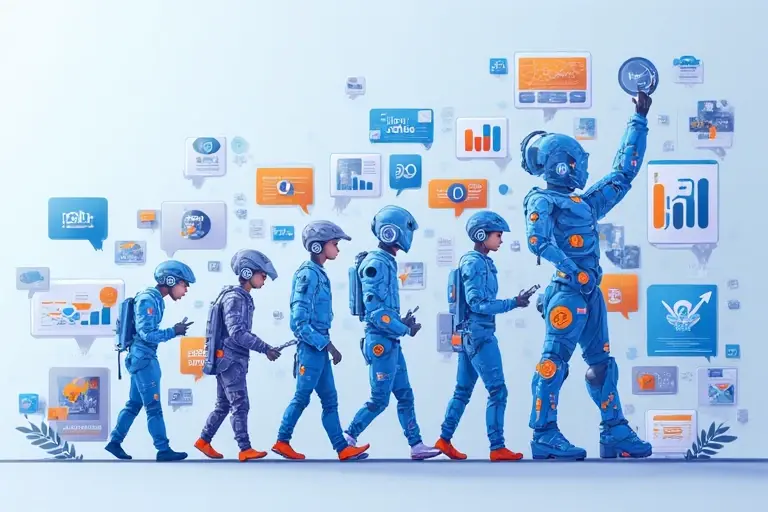
Digital marketing refers to the use of online platforms, tools, and channels to promote products or services and connect with customers. In today’s world, it’s an essential part of any business strategy. Digital marketing offers numerous opportunities for businesses to increase their visibility, engage with customers, and drive conversions. Unlike traditional marketing, digital marketing leverages the internet and digital platforms, which makes it measurable, cost-effective, and dynamic.
As businesses increasingly move online, it’s crucial to understand how digital marketing works and how it can help you grow. Digital marketing is vital in helping businesses reach their audience more directly through search engines, social media, and mobile applications. By engaging users where they spend most of their time—online—you create more opportunities for conversions.
Moreover, digital marketing is the evolution of traditional marketing practices. Instead of relying solely on print, radio, and TV, businesses now focus on channels like search engines, social media, and email, reaching a broader audience with more precision.
From its humble beginnings, digital marketing has undergone significant transformations. Initially, businesses relied on basic websites and email newsletters. As technology advanced, so did marketing strategies. Social media platforms, mobile apps, and content marketing emerged, providing businesses with new ways to connect with their audience.
In the past, Digital Marketing Strategy was largely limited to SEO, PPC (pay-per-click), and email campaigns. However, in recent years, AI and machine learning have begun to shape digital marketing strategies, enabling businesses to create personalized experiences and automate processes.
Looking forward, innovations like voice search, social commerce, and AI will dominate the landscape, revolutionizing how businesses connect with their target audience.
Building an effective digital marketing strategy starts with setting clear goals. Here’s a step-by-step approach to create a plan that drives results:
This strategic approach ensures that all efforts align with your business goals, maximizing your digital marketing impact.
The landscape of digital marketing is constantly changing. In 2025, we expect to see the following trends dominate:
The key difference between digital marketing and traditional marketing lies in their approach, reach, and measurability:
Digital marketing allows for better targeting, instant feedback, and lower costs. It’s more agile, offering the ability to adjust campaigns in real-time based on performance data.
Tracking ROI in digital marketing is essential for evaluating the effectiveness of your campaigns. Key methods for tracking include:
Tracking ROI enables marketers to adjust their strategies for optimal results.
The digital marketing funnel represents the journey a customer takes from awareness to purchase. It’s divided into four stages:
At each stage, your content and messaging should align to push the user toward conversion. Understanding and optimizing this funnel helps businesses nurture leads and increase sales.
For small businesses marketing, digital marketing is essential due to its cost-effectiveness and reach. Even with a limited budget, small businesses can leverage strategies like small business marketing, SEO, and social media marketing to compete with larger brands.
Digital marketing gives small businesses the tools to reach a wider audience without the large budgets that traditional advertising requires.
Data analytics in marketing provides valuable insights that help businesses optimize their campaigns. Tools like Google Analytics allow you to track customer behavior, preferences, and campaign performance. By analyzing data, businesses can make informed decisions that improve marketing outcomes and drive higher conversions.
Choosing the right channels depends on your target audience and marketing goals. Consider these options:
Each channel has its own strengths and weaknesses. The key is to align your efforts with your audience’s preferences.
Content marketing plays a vital role in any digital strategy. High-quality content attracts visitors, builds trust, and encourages conversions. Aligning your content marketing strategy with SEO efforts is crucial for achieving long-term success. By integrating content with SEO tactics, businesses can ensure their content ranks well and reaches the right audience.
Social media marketing allows businesses to engage with their audience in real-time. Best practices for social media marketing include:
Social media platforms also offer paid advertising options that allow you to target specific demographics and measure success.
Email marketing remains one of the most effective ways to nurture leads and build relationships. By building an email list, you can send personalized offers, product updates, and newsletters to engage your customers.
To improve your email marketing, focus on:
The future of digital marketing is centered on technological innovations and evolving consumer behaviors. Technologies like AI, machine learning, and AR will further personalize marketing efforts, while new platforms like social commerce will redefine online shopping.
In 2025, digital marketing continues to be a crucial element for business success. By staying updated on digital marketing trends, embracing data-driven decisions, and understanding the digital marketing funnel, businesses can ensure they remain competitive. Adaptability is key in this ever-evolving landscape.
What is digital marketing?
Why is digital marketing important?
How do I create a digital marketing strategy?
What is the digital marketing funnel?
How do I measure ROI in digital marketing?
What is SEO in digital marketing?
Why do small businesses need digital marketing?
What is A/B testing?
What is content marketing?
What is social media marketing?